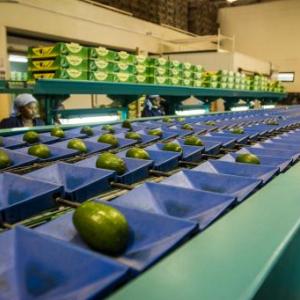The Political Economy, Rules, and Impersonal Exchange in Market Systems
Image

This is the fifth and final installment in the Feed the Future Enabling Environment for Food Security project's blog series exploring the relationship between the enabling environment and market systems. For further reading from the series, see the first, second, third, and fourth posts.
USAID’s Market Systems Framework recognizes the enabling environment — including the formal rules, informal norms, and relationships — as a critical factor influencing market actors’ incentives to invest in new technologies, practices, and services that increase specialization, improve resource allocation, and enhance system performance. This piece explores the role of the enabling environment — particularly the political economy — in influencing the transition from personal exchange to impersonal exchange as a crucial step towards market transformation.
What is impersonal exchange?
Developed countries rely on impersonal exchange to conduct most economic activity, from everyday transactions to larger, more sophisticated ones. Impersonal exchange has become so commonplace that it is woven into the fabric of market systems.
Some of the more well-known types of impersonal exchange include car loans, property sales, or security purchases in a 401k. In all of these cases, we do not need to know the individual personally with whom we are exchanging goods and services, and transactions are facilitated by a third party. The same is true for various shared economy services, which increase the connectivity between individuals through an expanded network.
These advancements have been made possible not only through improved technology but also through a comprehensive, effectively enforced legal and regulatory framework as well as access to counterparty information, which has fostered confidence among individuals and firms to exchange outside their personal network.
In all cases, impersonal exchange allows the expansion of economic activity. The positive impact on economic growth and market transformation from this shift cannot be overstated.
Why do market actors rely on personal networks?
In developing countries, relationship-based transactions remain more common than impersonal exchange. Where institutions are weak, and market actors do not trust the legal framework or organizational capacity to manage counterparty risk or to mediate a transaction efficiently, individuals will continue to rely on their own personal networks.

It is important to recognize personal exchange as a rational approach to managing counterparty risk where information asymmetry increases the transaction costs of impersonal exchange. But personal exchange is only rational in light of an enabling environment context that is not conducive to impersonal exchange. Reliance on personal networks for exchange could be seen more as a coping technique providing a suboptimal outcome and severely constraining the transformational capacity of a market system.
Where market actors rely solely on personal networks, which are often family- or ethnic-based, their opportunities are more limited and their costs are higher. For instance, a farmer relying on a personal relationship within her village for credit may ensure access to capital for herself, but she will almost certainly experience a higher cost of capital.
What role does the political economy play?
Douglass North, the Nobel Prize-winning development economist, provided a framework for understanding the role of the political economy in enabling impersonal exchange as a key step in the systemic change process.[1] As economies develop, groups of people become more interdependent, and more sophisticated institutions are needed to maximize the performance of systems. For economies to become more productive and inclusive, they require institutions to enact and enforce the rules that permit impersonal exchange.
Importantly, however, North observed that informal norms are engrained as behavioral drivers in a society, and they will therefore shape political institutions and the formal rules and, perhaps most importantly, their enforcement. Herein lies the importance of the political economy concerning impersonal exchange. If the informal norms in a society — and therefore within political institutions — foster incentives for resource capture within closed networks, then there will be little incentive to strengthen the rules and institutions that facilitate impersonal exchange.
These insights highlight the importance for development agencies and implementing partners to recognize that:
- Formal rules are necessary but insufficient to enable impersonal exchange and transform market systems. It is the evolution and the interaction of both formal rules and informal norms that will support adaptive, inclusive, and efficient market systems.
- Learning organizations, both public and private, that value the productive rather than extractive allocation of resources are necessary to transform systems. In the public sector, this requires a commitment to continual, evidence-based decision-making and rule enforcement. In the private sector, this requires ongoing investment in building the skills and knowledge necessary to compete effectively.
What does impersonal exchange look like in the agriculture sector?
There are several types of impersonal exchange needed to transform agricultural market systems in developing countries. Some more common ones include:
- Contract farming arrangements — forward purchase agreements between buyers and farmers.
- Mobile banking — where farmers pay for inputs and receive payments for outputs through a mobile app.
- Working capital loans — a formal line of credit for farmers, traders, and processors to invest in the daily operation of their agribusinesses.
- Warehouse receipts — where farmers and traders store commodity to borrow against and/or capitalize on variations in price throughout the year.
To reduce the transaction costs of impersonal exchange, public sector institutions are needed to provide the rules of the game, reduce information asymmetry, and provide effective enforcement mechanisms if a counterparty breaches an agreement. Some of the formal rules that enable impersonal exchange may include:
- Contract law — the rules used to enforce written agreements. To learn more about the importance of both formal rules and informal norms for contracts in Mali, see here.
- Financial and/or mobile network interoperability — a legal framework which encourages the exchange of information and transactions across institutions.
- Secured transaction laws — the rules governing collateralized lending. For a summary of access to finance constraints in Ghana, see here.
How can political economy analysis guide market systems interventions?
As noted earlier, the formal rules are necessary but insufficient. Development agencies and implementing partners must understand how the informal norms in a society provide incentives for political institutions to enact and effectively enforce formal rules.
While enabling environment analysis will tell you what is needed — that is, what is missing in the formal rules and institutional framework — political economy analysis (PEA) will tell you what is possible by identifying the incentives for change, the political levers for change, and the change agents. In this way, enabling environment analysis and PEA should be viewed as complementary and mutually reinforcing. Both are necessary to appropriately design and implement interventions intended to transform agricultural market systems from relying on personal exchange to enabling impersonal exchange.
Open Question to Readers!
In the country where you work, what barriers do farmers and other agricultural market actors encounter when engaging in impersonal exchange?
References
[1] Douglass C. North. “The New Institutional Economics and Development,” Economic History, (1993).


